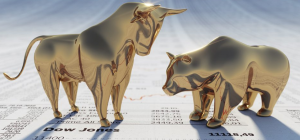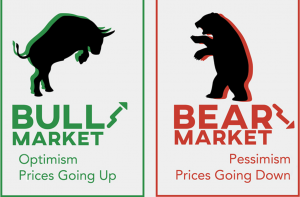Table of Contents
Bull and Bear Markets in Forex: Explained

The buzzwords ‘bull’ and ‘bear’ markets are thrown around quite a bit in the world of stocks and finance, but many people lack a true understanding of what they actually mean and why bull and bear markets in forex have any significance.
If you hope to understand the concept of bull and bear markets in forex and understand why they are important, then we first need to define these terms and discuss why they are used in the first place.
These terms, bear (bearish) and bull (bullish) are words used in order to describe the state the financial market is in, and how the markets are performing in general.
Essentially, they are shortcut words used about whether there is depreciation or appreciation in the market.
You will soon learn why this is so crucial in the world of forex, but first, let’s take a look at bull and bear markets in forex and what happens during periods of each.
Bull Market: Definition
In a bull (bullish) market, the market is rising.
When a certain financial instrument is trending upwards, we can describe this as a bull market.
Bear Market: Definition
In a bear (bearish) market, the market is going down.
When a financial instrument is trending downwards, we can describe this as a bear market.
It’s important to note that a single instance or day in which the market is performing in bearish or bullish form is not what defines a ‘bull’ or ‘bear’ market; rather, it is a long span of at least a couple weeks (but usually months) in which the market is either appreciating or depreciating.
Bull and bear markets are used to give definition to a general rise or falling trend in the markets.
Depending on which market we are in, this will demand a totally different strategy of investing (and/or forex trading).
Traders (including forex traders) tend to use a few types of either indicators or conditions (as represented on their charts) in order to judge whether they are experiencing a bull or bear market.
So, it’s essential to know whether we are in a bull or bear market in order to determine how you plan on trading or investing.
Let’s take an inside look at what happens during each of these markets.
What happens in a Bull Market?
During a bull market, it is typical for both traders and investors to be feeling pretty confident.
This is expected since, during bull markets, the economies are performing well.
During a bull market, good financial results are likely so therefore, positivity and optimism are at an all-time high.
During a bull market:
- the unemployment rate is low
- the GDP is high
- stock prices and the overall stock market is rising
Although a bull market is typically associated with equities (stock market), it most certainly applies to financial markets of all types, such as:
- bonds
- commodities
- currencies (forex!)
- many others.
So, what does a bull market mean for forex and forex traders?
When we are experiencing a bull market, not only is the economy performing well and financial assets rising, but foreign currencies rise as well!
This is especially true in the major currencies in emerging markets, including currencies such as:
- New Zealand Dollar (NZD)
- Canadian Dollar (CAD)
- Australian Dollar (AUD)
This has to do with these countries economies and where they make their money.
For example, not all currencies rise during a bull market.
In fact, some countries currencies (those considered ‘safe-haven currencies’) tend to decline in a bull market, including:
- US Dollar (USD)
- Japanese Yen (JPY)
- Swiss Franc (CHF)
Now that we’ve gone over the rising bull market, let’s take a look at the declining bear market.
What happens in a Bear Market?
The characteristics of a bear market are basically the opposite of a bull market.
During a bear market, the market exhibits an overall negative trend. For this reason, optimism is considerably less than during a bull market.
That said, since we can predict the trends during both bull and bear markets, there is still money to be made.
In a bear market, investors tend to sell assets deemed as ‘riskier’, like either stocks or currencies that are ‘less liquid’ (currencies from emerging markets).
The chance of losing in a bear market is much greater than in a bull market since financially-related prices are consistently decreasing in value.
Because of this, both traders and investors are more inclined to either:
- short-sell, a common strategy to make money during a bear market, or
- move to ‘safer’ investment, like that of fixed-income securities or gold.
Safe-haven currencies, such as the US Dollar (USD) or the Japanese Yen (JPY) are preferred by investors in a bear market – the opposite of what investors and traders do during a bull market.
Hopefully, you understand (at least somewhat) the basics of bull and bear markets – now let’s discuss why this matters to you, the forex trader.
Bull and Bear Markets in Forex: Why it Matters
As you surely know, forex trading is done in pairs, always.
We are profiting off of the always-changing difference in prices of currencies – if one currency is strengthening, this means that another currency is weakening.
Luckily, we are able to trade both ways.
Knowing all about bull and bear markets in forex is key to using it to your advantage.
In either currency pair, we can either 1) take a long or 2)short view.
In simpler words, we can either buy or sell in a currency pair.
This means as forex traders, we can take advantage of both falling and rising markets.
Whether we happen to be in a bearish or bullish market, we can adjust our strategy in order to profit off of how the markets are performing and how different currencies are shifting in value in relation to one another.
In the forex market, the strength of different currencies is determined by bull and bear trends.
If we are able to grasp the trends of the markets, we as forex traders can make decisions on how to manage our risk.
Depending on the type of market we are in, we can more accurately predict the best time to either exit or enter a trade.
As long as you are able to trade with the trends, you can make significant profits during both a bull or bear market.
As a forex trader, all you need to do is buy the strong and sell the weak.
Here’s a great video that explains the concept of bull and bear markets quite well (although he doesn’t necessarily discuss how it related to forex trading):
Bull and Bear Markets in Forex: Final Words
Bull and Bear Markets will have a significant influence on your forex trading and investing.
For this reason, it is very necessary to understand how the market is performing in order to make financial decisions.
This is especially true for forex trading – since currencies fluctuate so often and volatility is high, it is essential for our longevity in the forex game to know exactly what currencies we are trading and why.
Learn to Trade Forex
For those who are new to forex trading and want to know more, this is for you.
Simply learning terms like ‘bull’ and ‘bear’ markets are great ways to increase your forex knowledge, but it will not actually help you make profitable trades.

If you would like to learn how to make big trades (no matter how the markets are doing), head on over to our Forex Mentor Pro 2.0 Review.
This system is excellent for beginner traders and will really help you learn how to trade.
Also, if you haven’t already, make sure to grab your Free Forex Trading Fortunes PDF – simply look below to get your copy sent straight to your email.
[convertkit form=1499651]
I’m a full-time forex trader, happily making money from the comfort of my own home.
I help others find financial freedom and success with forex trading.




